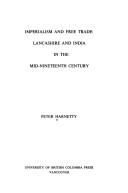| Listing 1 - 4 of 4 |
Sort by
|
Book
ISBN: 0678007349 Year: 1972 Publisher: New York Kelley
Abstract | Keywords | Export | Availability | Bookmark
 Loading...
Loading...Choose an application
- Reference Manager
- EndNote
- RefWorks (Direct export to RefWorks)
Free trade --- Protectionism --- Tariff

ISBN: 0774800054 Year: 1972 Publisher: Vancouver (B.C.) : University of British Columbia press,
Abstract | Keywords | Export | Availability | Bookmark
 Loading...
Loading...Choose an application
- Reference Manager
- EndNote
- RefWorks (Direct export to RefWorks)
Cotton trade --- Cotton trade --- Free trade --- Protectionism --- Great Britain --- India --- Lancashire (England) --- Foreign economic relations --- Foreign economic relations --- Economic conditions.
Book
Year: 1972 Publisher: Washington, D.C. : The World Bank,
Abstract | Keywords | Export | Availability | Bookmark
 Loading...
Loading...Choose an application
- Reference Manager
- EndNote
- RefWorks (Direct export to RefWorks)
Robert S. McNamara, President of the World Bank Group, says the relationship between two fundamental requirements need to be examined: the necessity for economic development; and the preservation of the environment. He outlines the steps the Bank is taking to deal with the ramifications of that relationship and illustrates practical measures that are proving to be both feasible and effective. He suggests the most useful direction for the international development community is to assist in the economic advance of the developing countries while responsibly preserving and enhancing the environment. He points out that the broad statistical evidence is clear that there is dangerously skewed distribution of income both within developing nations, and between the collectively affluent and the collectively indigent nations. He reemphasizes that development cannot succeed unless that massively distorted distribution of income is brought into a reasonable balance. He also suggests that what is needed is the close cooperation of economists and ecologists, of social and physical scientists, of experienced political leaders and development project specialists. He briefs about five essential requirements to assist in preserving and enhancing the environment. First, recognize that economic growth in the developing countries is essential if they are to deal with their human problems. Second, act on the evidence that such growth need not cause unacceptable ecological penalties. Third, assist the developing countries in their choice of a pattern of growth which will yield a combination of high economic gain with low environmental risk. Fourth, provide external support required for that economic advance by moving more rapidly toward meeting the United Nations concessionary aid target and by dismantling and discarding inequitable trade barriers which restrict exports from poorer countries. Fifth, realize that human degradation is the most dangerous pollutant there is. He says that the impetus for this conference is respect for man and his home and that respect can be translated into practical action. The leading edge of that action is to protect man from the one hazard which can injure not only his habitat and his health, but his spirit as well. He concludes that poverty is cruel and senseless, but curable. The task, he urges, is not to create an idyllic environment peopled by the poor, but to create a decent environment peopled by the proud.
Agricultural Sector --- Climate Change and Environment --- Debt --- Developed Countries --- Developing Countries --- Development Patterns and Poverty --- Economic Development --- Environment --- Exchange Rates --- Income Distribution --- Inequality --- Official Development Assistance --- Per Capita Income --- Poverty Line --- Protectionism --- Trade Liberalization
Book
Year: 1972 Publisher: Washington, D.C. : The World Bank,
Abstract | Keywords | Export | Availability | Bookmark
 Loading...
Loading...Choose an application
- Reference Manager
- EndNote
- RefWorks (Direct export to RefWorks)
Robert S. McNamara, President of the World Bank Group, believes that the state of development in most of the developing world today is unacceptable. It is unacceptable, but not because there has not been progress. There has been the total economic growth, measured in Gross National product (GNP) terms, for the developing countries during the first development decade was impressive. For some of these countries it was the most successful decade measured in these gross economic terms in their history. Finally, if the state of development today is unacceptable, we must not waste time looking for villains. Rather, the entire international development community must promptly move forward with practical measures which are conceptually sound, financially feasible, and which can command the requisite public support. He spoke about income distribution, official development assistance efforts, debt problems, trade expansion, and the World Bank's Five-Year Program.
Agricultural Sector --- Debt --- Debt Markets --- Developed Countries --- Developing Countries --- Development Economics and Aid Effectiveness --- Economic Development --- Exchange Rates --- Finance and Financial Sector Development --- Income Distribution --- Inequality --- Macroeconomics and Economic Growth --- Official Development Assistance --- Per Capita Income --- Poverty Line --- Protectionism --- Trade Liberalization
| Listing 1 - 4 of 4 |
Sort by
|

 Search
Search Feedback
Feedback About
About Help
Help News
News